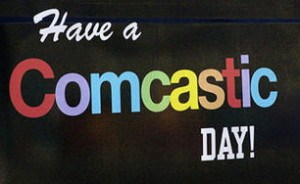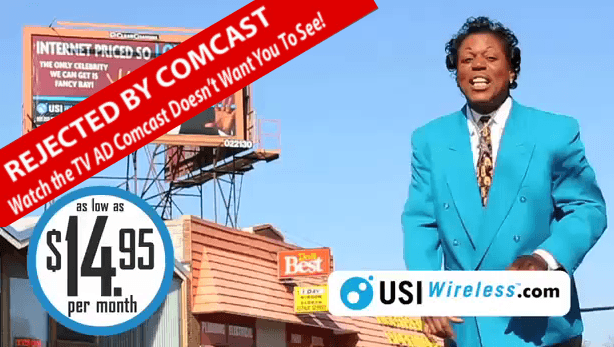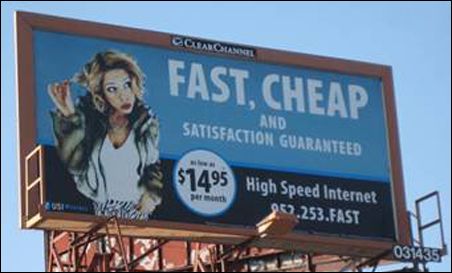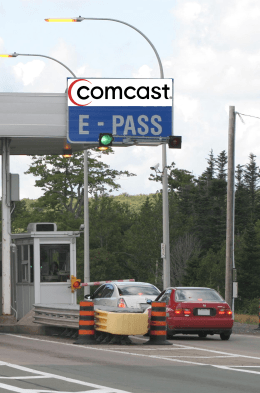 America’s largest cable company, the one seeking permission to become even bigger with a buyout of NBC-Universal, has spent the last two weeks alienating customers, vendors, and some members of Congress. After Stop the Cap! reported on another cable company’s service outage, our reader Jared wrote to say Time Warner Cable customers should feel lucky because they can get service credits for outages. Good luck getting them from Comcast.
America’s largest cable company, the one seeking permission to become even bigger with a buyout of NBC-Universal, has spent the last two weeks alienating customers, vendors, and some members of Congress. After Stop the Cap! reported on another cable company’s service outage, our reader Jared wrote to say Time Warner Cable customers should feel lucky because they can get service credits for outages. Good luck getting them from Comcast.
He, along with more than a million other Comcast customers spent the early hours of CyberMonday offline thanks to a widespread Comcast outage on the eastern seaboard. Outages happen, but what annoyed Jared was Comcast’s “Don’t Care” attitude, which began when he picked up the phone to call the company.
WBUR Radio in Boston explored, in plain English, the reasons for the Comcast CyberMonday outage and how it affected customers. (5 minutes)
You must remain on this page to hear the clip, or you can download the clip and listen later.
<
p style=”text-align: center;”>
“I, along with probably several hundred thousand other people called Comcast’s 800 number to find out what was going on,” he writes. “After more than a dozen minutes of busy signals, when I finally got through, a recording came on literally telling me to go to Comcast’s website for assistance! Duh!”
Moments after that, another recording came on the line telling him Comcast was too busy to take his call (or even leave him on hold) and he should call back later, at which point the line disconnected.
Infuriated, he called back and managed to navigate the voice menu to a human being who seem offended he was forced to take Jared’s call.
“This guy told me he didn’t know about any outage, which must have meant he was sitting in some call center well away from the region,” Jared says. “By now, anyone trying to use Comcast broadband in the northeast who still had a pulse knew it was down.”
But Comcast never misses an opportunity to miss an opportunity, further alienating Jared when the representative tried to change the subject and sell him Comcast phone service.
“I was stunned,” Jared says. “I asked him if he was serious — why would I want to buy phone service from a cable company that cannot even manage its own phones and hangs up on customers?”
Jared asked if he could obtain a service credit for his Internet downtime.
“No,” came the reply. “Your service has to be out for at least 24 hours.”
Jared countered he might not be a Comcast customer in 24 hours.
“That’s your choice,” said the voice on the other end of the line.
[flv width=”640″ height=”500″]http://www.phillipdampier.com/video/WMUR WBAL Comcast Outage 11-28-10.flv[/flv]
WMUR-TV in Manchester, N.H., and WBAL-TV in Baltimore were just two of many television stations that reported on Comcast’s CyberMonday outage. (4 minutes)
Getting a copy of Comcast’s terms and conditions is not easy for non-customers. The company wants your contact and customer information before it will admit you to its online forum and other website documents. We found numerous instances of customers getting rejected for service credits on several websites covering the story. But not all. Those escalating their demands to a service manager or ending up connected to a customer retention specialist have managed to grab up to $10 in credit for the multi-hour outage, but prying them loose from the cable giant is not easy.
Our efforts to get a Comcast representative to explain the service credit procedure for the benefit of their customers reading Stop the Cap! met with silence.
Meanwhile, the Chicago Sun-Times got into it with Comcast and managed to get a spokesperson to relent — customers could get a credit by applying for one individually, but don’t count on a big payback. Spokeswoman Angelynne Amores told the newspaper subscribers were eligible to receive a $1 credit for the trouble, but only if they asked.
Comcast does provide a flowery feel-good customer guarantee that includes a link to a customer contact form, which might cut through some red tape for customers seeking a refund, even if just a dollar, for the service they did not receive.
[flv width=”480″ height=”380″]http://www.phillipdampier.com/video/WWLP Springfield Comcast Outage 11-28-10.flv[/flv]
No credit for you from Comcast, notes WWLP-TV in Springfield, Mass. Their viewers in New Hampshire will get nothing from Comcast for their broadband troubles. (1 minute)


 Subscribe
Subscribe





